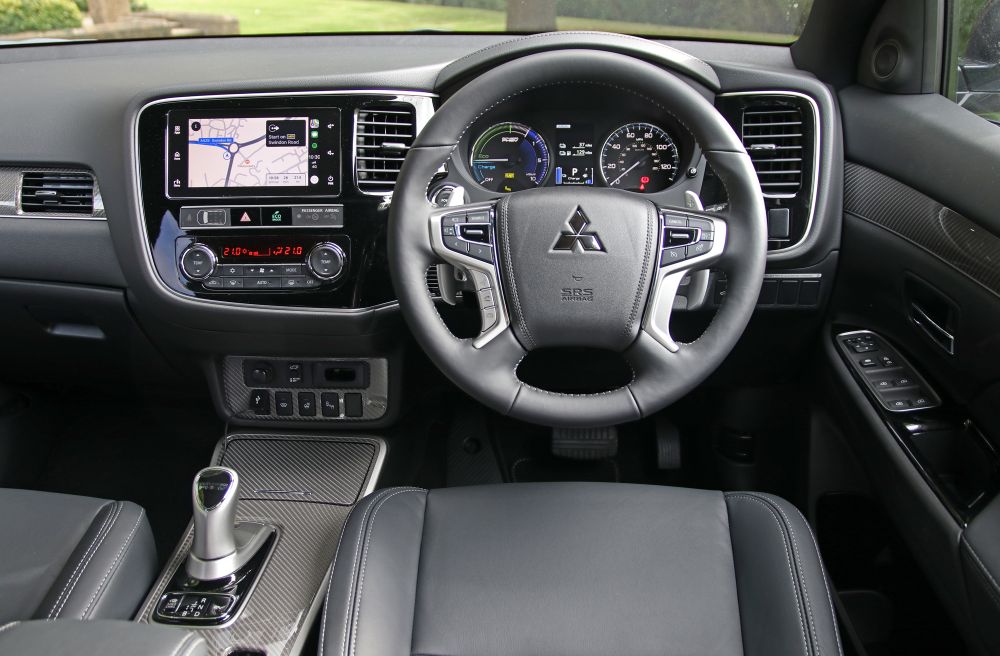The Mitsubishi Outlander PHEV is the car that switched Britain onto the idea of plug-in hybrids. Launched in 2013, with the earliest models carrying a ‘63’ registration, it was the first relatively mainstream model to successfully combine zero-emissions battery electric driving with petrol power for longer distances.
It lived up to its SUV appearance with a clever dual-motor setup, which saw electric drive delivered to both front and rear wheels. Result? Grippy 4WD traction, perfect for keeping going in winter weather.
The Outlander PHEV went on to become the top-selling plug-in hybrid in the UK, success that’s only compounded with each passing year. Such popularity means there are plenty for sale on the second-hand market, with prices starting from just £7,500.
Prices
The Mitsubishi Outlander PHEV is a well-known plug-in hybrid that remains in strong demand on the used market. Healthy new car sales mean there is no shortage of choice, and this is also starting to help prices become gradually more affordable.
You still have to budget from around £7,500 for an early 2014 Outlander PHEV, and even this will probably only get you a high-mileage version with more than 100,000 miles on the clock. Still, that’s not much more than a conventional family-sized SUV alternative, and they don’t have the advantage of the Mitsubishi’s EV-only capability. If you don’t want a six-figure mileage on your prospective 64-reg Outlander, you’ll need to up your budget to around £9,000.
In autumn 2015, the Outlander PHEV received a very comprehensive facelift, bringing much more stylish looks. We prefer this version and think it’s well worth budgeting the extra cash required for one. How much extra? Well, 2016 models with around 90,000 miles on the clock can be found from around £11,500, with lower-mileage examples from around £13,000.
The car was facelifted again in 2018 – are you keeping up? – and while the styling received less of an overhaul (a top tip to spot them in the classifieds is the square, rather than round, front fog lights), there were bigger changes under the skin, including a new 2.4-litre engine and more efficient electric drive gadgetry. These are the most expensive Outlander PHEV models: expect to pay from around £19,000.
Fantastic facelift
The Outlander PHEV was a late addition to the regular Outlander line-up, which launched as a regular petrol and diesel SUV in 2012. The arrival of the PHEV version really put the car on the map, thanks to its sub-50g/km CO2 emissions, quoted 32-mile EV range and eligibility for the government Plug-in Car Grant, which was a generous £5,000 back then. The lure of the money helped people overlook the fact it was a little bland-looking and undercooked in its original guise.
Mitsubishi was aware of this, though, and already hard at work on an upgrade. It was revealed in late 2015, for cars registered from 2016 onwards. Facelifted versions look far more upmarket, with a larger grille, bigger LED headlights, sleek side skirts and chunkier bumpers. The difference is like night and day. Inside, leather upholstery was standardised and the dashboard given a similarly premium-like makeover, with climate control now coming on all versions.
The buzzy 2.0-litre petrol engine was retained, but the electric-drive tech was improved, giving better pure EV acceleration at lower speeds. Drivers could still switch between EV and hybrid mode too. Facelifted models are nicer to drive as well, thanks to tweaked suspension that tightened up the handling and improved the ride.
Bigger engine
The 2018 facelift is less obvious, but it did bring that larger 2.4-litre engine. This has more pulling power, so the Outlander PHEV is a bit less frenetic when switching between electric and petrol modes. The software doesn’t send engine revs sky-high quite so frequently, helping with refinement. Tech geeks also liked the fact it now operated on the more efficient Atkinson combustion cycle, potentially improving real-world fuel economy.
Mitsubishi fitted a new rear electric motor, improved the generator and boosted battery capacity as well, which rose from 12kWh to 13.8kWh. However, this was the time that new, stricter WLTP fuel economy regulations came into force, so quoted fuel economy is actually a little worse. CO2 emissions still dip below 50g/km, however, and it’s a measure of the improved efficiency that the official EV range was a decent-sounding 28 miles, despite the tougher test regime.
Fuel economy
On paper, the Outlander PHEV delivers staggering fuel economy of more than 150mpg. But don’t be misled. It only does this on the official fuel economy test, where it starts out with a full battery, only using the petrol engine at the end of the test.
In real-world use, it’s more mixed. If you mainly run short trips and can regularly recharge, the Outlander PHEV will be brilliant on fuel, potentially going months without a refill. However, if you regularly do long motorway journeys, or rarely recharge the batteries, it will be a pretty thirsty machine, struggling to top 30mpg. It’s the same for all plug-in hybrids, of course; just don’t expect the impossible.
At least you still get the tax-saving benefits of sub-50g/km CO2 emissions on all Outlander PHEVs. Oh, and while we’re on the subject of efficiency, the general rule of thumb is to expect around 25 miles of pure EV range. It will go down when it’s cold, and can nudge up to just over 30 miles on a mild summer’s day with the air-con set to ‘ECO’.
What goes wrong?
We can reassure you straight away here. The Mitsubishi Outlander PHEV is an extremely reliable and dependable plug-in hybrid, one that has consistently ranked very highly in reliability surveys since its launch.
Some owners are almost evangelical, and trade expert Neal Shaw from Brindley Fleet and Leasing says he has supplied thousands and “can honestly count on one hand cars that have had serious issues, all of which were satisfactorily resolved.
“It has amazed me, with the technology that goes into the PHEV, just how reliable it has been.”
That’s not to say there aren’t a few things to look out for. Post-facelift models replaced the standard manual handbrake with an electronic parking brake, and a couple of owners have reported it occasionally failing to release first time. This, we admit, could also be user error, so it’s worth reading the owner’s manual to understand exactly how it works.
Another grumble actually seems to underline just how reliable the Outlander PHEV is: the most-mentioned problem is bent or broken clips on the charging flap, which can leave it flopping open. Both Mitsubishi dealers and some specialists are well versed in fixing this, so it won’t be an expensive repair. And if that’s the biggest thing people have to complain about, well…
Warranty-wise
The Mitsubishi Outlander PHEV originally came with a three-year warranty. Perfectly generous, and in line with its rivals. But it’s worth looking for 2015-on cars, as they came with an improved five-year warranty. Even if it’s now since expired, it should be reassuring, as it means any issues will have been resolved free of charge, rather than simply ignored.
If you’re buying a newer model, make sure the service history is fully up to date, or else any remaining warranty could be invalidated. Oh, and if you’re worried about battery life, fear not: the Outlander PHEV comes with an eight-year battery warranty, which should allay your concerns.
Interior
The roomy interior of the Outlander PHEV is a family-friendly draw. It seats five people in comfort and the upright design means it feels airy and spacious. It only has five seats, though, unlike non-PHEV Outlander models which can seat up to seven. The batteries have to go somewhere – and that’s into the space where the third row of seats otherwise fits. The boot itself is roomy, nonetheless.
Mitsubishi has sold the Outlander PHEV in a confusing array of trims. Originally, they were GX3h, GX4h and GX5h, with GX4hs and GX5hs adding extra goodies. Basically, the higher the number, the more equipment you get. This later evolved into Design, Dynamic and Exceed variants, with several special editions including Juro and Keiko also cropping up over the years. Oh, and if you see a 4Work version, that’s the van-style commercial model, with no rear seats but an expanded load bay (and VAT-free appeal).
Generally, whichever spec you choose, the Outlander PHEV will carry a decent amount of kit. Higher-spec versions are jammed with goodies and you’ll love playing with all the buttons on the dashboard, discovering things such as heated seats and a premium audio system.
Charging
The Mitsubishi Outlander PHEV has two charging sockets behind the flap on the rear right-hand side. The first is a Type 1 socket, which owners use either at home or at most public AC points. There’s also a CHAdeMO DC connector that allows rapid charging.
If you have a 7kW wallbox at home, it will take around 3.5 hours to fully charge an Outlander PHEV – or twice that if you’re using a regular plug socket. If you use a 50kW public rapid charger, this will take just 25 minutes – minimising the time you spend parked up to continue driving in pure EV mode.
Summary
It’s not hard to see why the Mitsubishi Outlander PHEV has become one of Britain’s most popular electrified cars over the years. It combines SUV style, plug-in capabilities and an ever-growing reputation for reliability and dependability. If you’re seeking a stepping stone into electrifying motoring, it’s a convincing, compromise-free choice, particularly as prices are becoming ever-better value. Around 40,000 British buyers (and counting) really can’t be wrong.






















